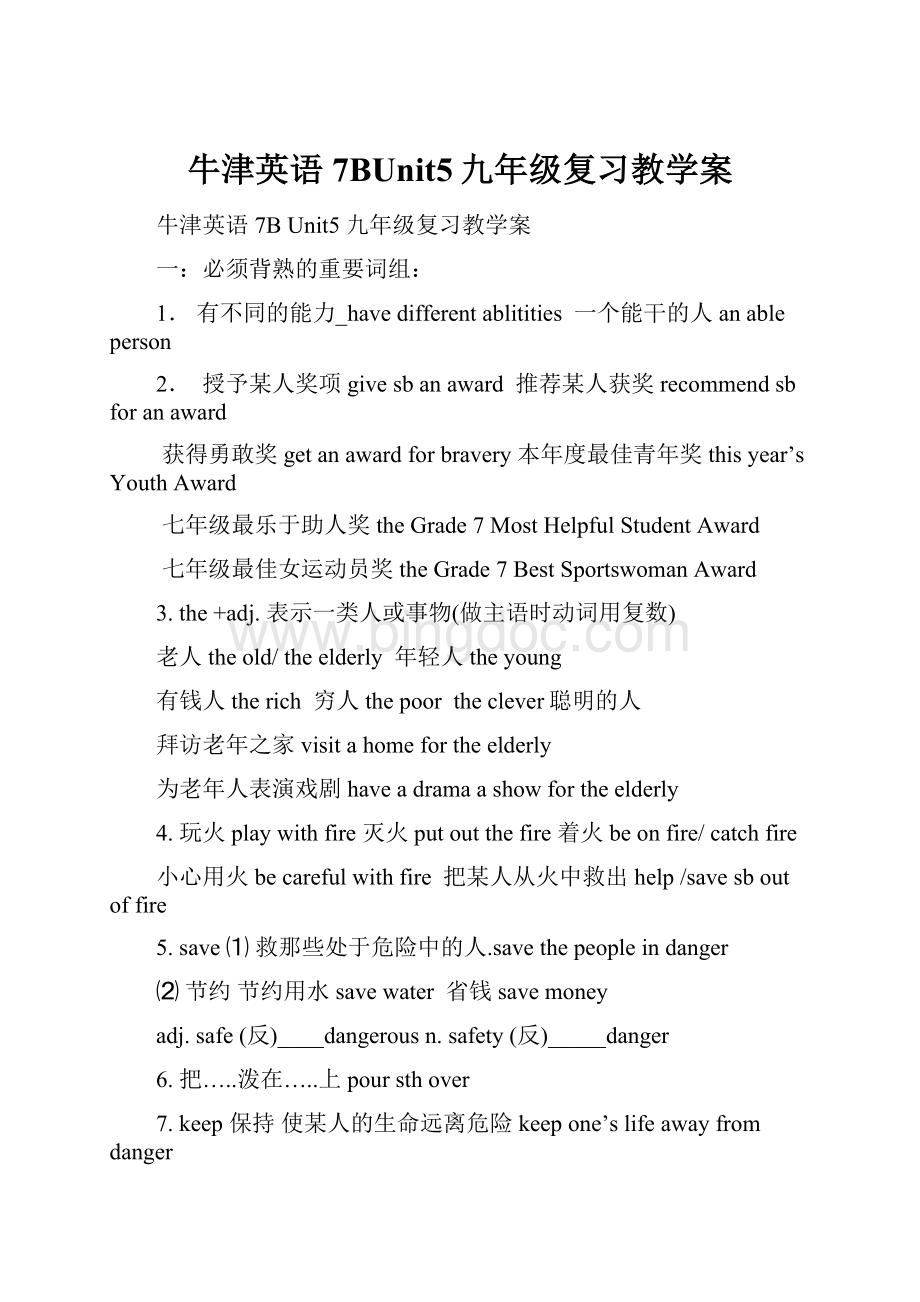牛津英语7BUnit5九年级复习教学案Word下载.docx
《牛津英语7BUnit5九年级复习教学案Word下载.docx》由会员分享,可在线阅读,更多相关《牛津英语7BUnit5九年级复习教学案Word下载.docx(22页珍藏版)》请在冰点文库上搜索。

阻止某人做某事keep/stop/preventsbfromdoing
很抱歉让你等这么久.I’msorrytokeepyouwaitingforsuchalongtime/solong
Somethingmustbedonetokeepthetrafficaccdientfromhappening.
8.对某人感到感谢begratefultosb对某事感到感激begrateful/thankfultosbforsth
9.在----方面有好的成绩havegoodgradesin….
10.很好的组织班级活动organizeclassactivitieswell
11在去某地的路上onone’swaytosp
在他去上学/电影院/回家的路上onhiswaytoschool/tothecinema/home
在去游泳的路上onthewaytoswim
12.清理公园cleanupthepark13.给某人让座givesbaseat
二:
必须背熟的重要句子:
1.Someorganizationsgiveawardstopeopleforthethingstheydo.有些组织机构为那些做事的人给予奖励。
2.WandFangquicklyranbacktoherflatandpouredwateroverherjacket王芳汛速跑回到公寓并把水泼在毯子上
3.SheputoutthefirewithablanketandhelpedMrSunout.她用毯子把火扑灭并帮孙先生出去
4.FirecanbedangerousItisimportanttobecarefulwithfire.It’spossibleforfiretocausedangerifwearenotcareful.火可能很危险,小心用火很重要。
如果我们不小心火可能引起危险
5.Didyoudoanythingforyourownsafety?
你为自己的危险做了一些事情了吗?
6.Firesafety:
(用火安全)
Becarefulwithmatches
Donotleavethestoveon.
Donotputanythinghotintotherubbishbin
keeplonghairawayfromfire
.小心使用火柴
别把火炉开着
别把热的东西放进垃圾箱
别让长头发靠火炉
7.IwouldliketorecommendChenDanfortheGrade7MostHelpfulStudentAwardbecauseheiskind,brave,helpfulandpolite我想推荐陈丹为七年级最乐于助人奖,因为他善良,勇敢,乐于助人且有礼貌。
8.It’ssnowinginCanada,Wecangoskiingthere.加拿大在下雪,我们可以去那儿滑雪
9.MrSuncouldnotgetoutbecausehehurthisleg.孙先生不能出去,因为他的腿受了伤。
10.Idon’tplaybasketballveryoften.I’msurethatI”lllosethegamewithin10minutes.我不能经常打篮球。
我肯定我在10分钟内会输掉球
11.Welookforwardtohearingfromyousoon.我盼望着收到你的来信。
三:
重要知识点;
1.thinkof….想起…..
他总是先考虑别人.Healwaysthinksofothersfirst
比起自己来他更多的考虑别人.Hethinksmoreofothersthanofhimself.
2.她经常告诉小一点的学生进行水上运动时要小心.
Sheoftentellsyoungerstudentstobecarefulwhentheyplaywatersports
3.within在….之内
去年我等了好几个小时才钓到一条鱼.但可能今年我会在5分钟内钓到一条鱼.
Lastyear,Icaughtafishafterwaitingformanyhours,butmaybeI’llcatchafish
withinfiveminutes.
我肯定我会在十分钟内输掉这场比赛.
I’msurethatI’lllosethegamewithintenminutes.
4.doAinsteadofdoingB
如果你想看看世界各地的名胜,你可以去世界公园而不用去周游世界。
Ifyouwanttotakealookatplacesofinterestallovertheworld,youcangototheWorldParkinsteadoftravelingaroundtheworld.
5.奶奶年纪大了但记性很好.Grandmaisoldbutshehasagoodmemory
6.你应该更经常读英语用英语.
YoushouldreadEnglishmoreoftenanduseEnglishmoreoften.
7.尽力做某事do/tryone’sbesttodosth
如果她尽力的话,她在地理方面会取得更好的结果.
Shecangetbetterresultsingeographyifshedoesherbest.
8.我想她明年能进入校队.Ithinkshecangetintotheschoolteamnextyear.
9.说出中小学间的区别.Tellthedifferencesbetwwensecondaryschoolsandprimaryschools
10.陈丹考虑问题很周到工作时很认真.
ChenDanisthoughtfulandthinkscarefullywhenheworks.
11可能的_possible不可能的impossible_
It’s(highly)possible(forsb.)todosth.
It’spossiblethat……
Eg.It’shighlypossibleforhumanstoliveonMarsinthefuture
It’spossiblethathewillleavetomorrow.
14.There’sonlyasmallchancethatIwillnotplay.
15.likely---morelikely---mostlikely
It’slikelythat…….Eg.It’slikelythathemightbeheretomorrowmorning.
Sbbelikelytodo……Ticketsarelikelytobeveryexpensive.
17孙先生79岁.MrSunis79yearsold
孙先生是位79岁的老人.MrSunisa79-year-oldman
这栋房子高10米.Thehouseis10metershigh
这是一栋高10米的房子.Thisisa10-meter-highhouse
18消防队员冲进屋子去救那些处于危险中的人Thefiremenrushedintothehousetosavethepeopleindanger.
19.见某人做了某事hearsbdosth听见某人正在做某事hearsbdoingsth
我经常听见他在房间唱歌.Ioftenhearhimsinginhisroom.
当我从他家旁边经过时,我听见他在唱歌WhenIwalkedpasthishouse,Iheardhimsinging
她听见她的邻居孙先生在喊救命.Sheheardherneighour,MrSunshoutingforhelp.
20smoke⑴u.n.烟烟很大,火势很旺.Therewasalotofsmokeandthefirewasveryhot
⑵v.抽烟吸烟有害健康.Smokingisbadforhealth
21.adj.careful-------(反)carless
adv.carefully------(反)carelessly
小心BecarefulTakecareLookout
对…..小心becarefulwith
如果你不小心的话,火可能比较危险.Firecanbedangerousifyouaren’tcareful
小心用火是重要的.It’simportanttobecarefulwithfire
Whatacarefulstudentheis!
Howcarefullyhedoeseverything!
Hemakesfewmistakes.
四:
.情态动词用法归纳
情态动词有can(could),may(might),must,haveto,shall(should,will(would),dare(dared),need(needed),oughtto等。
情态动词无人称和数的变化;
不能单独使用,必须与其后的动词原形构成谓语
一、can,could
1)表示能力(体力、知识、技能)。
Canyouliftthisheavybox?
(体力)
Marycanspeakthreelanguages.(知识)
Canyouskate?
(技能)
此时可用beableto代替。
Can只有一般现在时和一般过去式而beableto则有更多的时态。
I’llnotbeabletocomethisafternoon.
当表示“经过努力才得以做成功某事”时应用beableto,不能用Can。
如:
Hewasabletogotothepartyyesterdayeveninginspiteoftheheavyrain.
2)表示请求和允许。
-----CanIgonow?
-----Yes,youcan./No,youcan’t.
此时可与may互换。
在疑问句中还可用could,
might代替,不是过去式,只是语气更委婉,不能用于肯定句和答语中。
----CouldIcometoseeyoutomorrow?
----Yes,youcan.(No,I’mafraidnot.)
3)表示客观可能性(客观原因形成的能力)。
They’vechangedthetimetable,sowecangobybusinstead.
Thishallcanhold500peopleatleast.
4)表示推测(惊讶、怀疑、不相信的态度),用于疑问句、否定句和感叹句中。
Canthisbetrue?
Thiscan’tbedonebyhim.
Howcanthisbetrue?
二、may,might
1)表示请求和允许。
might比may语气更委婉,而不是过去式。
否定回答时可用can’t
或mustn’t,表示“不可以,禁止”。
----Might/MayIsmokeinthisroom?
----No,youmustn’t.
----May/MightItakethisbookoutoftheroom?
----Yes,youcan.(No,youcan’t/mustn’t.)
用MayI...?
征徇对方许可时比较正式和客气,而用CanI...?
在口语中更常见。
2)用于祈使句,表示祝愿。
Mayyousucceed!
3)表示推测、可能性(不用于疑问句)。
might不是过去式,它所表示的可能性比may小。
1.Hemay/mightbeverybusynow.
2.Yourmothermay/mightnotknowthetruth.
三、must,haveto
1)表示必须、必要。
Youmustcomeintime.
在回答引出的问句时,如果是否定的,不能用mustn’t(禁止,不准),而用needn’t,don’thaveto(不必).
----Mustwehandinourexercisebookstoday?
----Yes,youmust.
----No,youdon’thaveto/youneedn’t.
2)must是说话人的主观看法,而haveto则强调客观需要。
Must只有一般现在时,haveto有更多的时态形式。
1.heplayisn’tinteresting,Ireallymustgonow.
2.IhadtoworkwhenIwasyourage.
3)表示推测、可能性(只用于肯定的陈述句)
1.You’reTom’sgoodfriend,soyoumustknowwhathelikesbest.
2.Yourmothermustbewaitingforyounow.
四、dare,need
1)dare作情态动词用时,常用于疑问句、否定句和条件从句中,过去式形式为dared。
1.HowdareyousayI’munfair?
2.Hedaren’tspeakEnglishbeforesuchacrowd,darehe?
3.Ifwedarednotgotherethatday,wecouldn’tgetthebeautifulflowers.
2)need作情态动词用时,常用于疑问句、否定句。
在肯定句中一般用must,haveto,oughtto,should代替。
1.Youneedn’tcomesoearly.
2.----NeedIfinishtheworktoday?
----Yes,youmust./No,youneedn’t.
3)dare和need作实义动词用时,有人称、时态和数的变化。
在肯定句中,dare后面常接带to的不定式。
在疑问句和否定句中,dare后面可接带to或不带to的不定式。
而need后面只能接带to的不定式。
1.Idaretoswimacrossthisriver.
2.Hedoesn’tdare(to)answer.
3.Heneedstofinishhishomeworktoday.
五、shall,should
1)shall用于第一人称,征求对方的意见。
Whatshallwedothisevening?
六、will,would
1)表示请求、建议等,would更委婉。
Will/Wouldyoupassmetheball,please?
2)表示意志、愿望和决心。
1.Iwillneverdothatagain.
2.Theyaskedhimifhewouldgoabroad.
3)would表示过去反复发生的动作或某种倾向。
would表示过去习惯时比usedto正式,且没有“现已无此习惯”的含义。
1.Duringthevacation,hewouldvisitmeeveryotherday.
2.Thewoundwouldnotheal.
4)表示估计和猜想。
Itwouldbeaboutteno’clockwhenshelefthome.
七、should,oughtto
1)should,oughtto表示“应该”,oughtto表示义务或责任,比should语气重。
1.Ishouldhelpherbecausesheisintrouble.
2.Yououghttotakecareofthebaby.
2)表示劝告、建议和命令。
should,oughtto可通用,但在疑问句中常用should。
1.Youshould/oughttogotoclassrightaway.
2.ShouldIopenthewindow?
3)表示推测
should,oughtto(客观推测),must(主观推测)。
1.Hemustbehomebynow.(断定他已到家)
2.Heoughtto/shouldbehomebynow.(不太肯定)
3.Thisiswheretheoilmustbe.(直爽)
4.Thisiswheretheoiloughtto/shouldbe.(含蓄)
五:
巩固练习:
.选择:
()1.Sheisbusyflowersinthegarden.
A.togrowB.growC.growingD.grows
()2.Whichcitydoyou?
A.liveB.toliveinC.liveinD.tolive
()3.There’sabridgetheriver.
A.onB.aboveC.overD.in
()4.“Howmanypeoplearethereintheroom?
”“.”
A.NoB.NothingC.NotD.None
()5.Howdoyousay“356008”?
“”
A.Threethousandandfifty-sixandeight.
B.Threehundredandfifty-sixthousandandeight.
C.Threehundredandfifty-sixthousandeight.
D.Threefivesixzerozeroeight.
()6.Heisverytired,becauseheworks.
A.alotofB.lotsofC.manyD.alot
()7.Thisbikebelongto.
A.meB.mineC.myD.I
()8.ItMary’sbook.Yoursisinyourbag.
A.maybe,MaybeB.maybe,May
C.maybe,MaybeD.maybe,Maybe
()9.Ihavemanybooks.I’mbusy.
A.toreadB.readingC.readD.reads
()10.Hisbikeisdifferent.
A.frommyB.frommine
C.withmineD.withmy
()11.Thecoffeetableisthebedandthedesk.
A.behindB.betweenC.besidesD.below